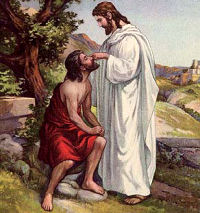Make your gift today!
Help keep Catholics around the world educated and informed.
Already donated? Log in to stop seeing these donation pop-ups.
» Enjoy our Liturgical Seasons series of e-books!
Cycle B
The first reading is from the book of the Prophet Jeremiah, 31:7-9, "Behold I will bring them back from the land of the north; I will gather them from the ends of the world, with the blind and the lame in their midst, the mothers and those with child; they shall return as an immense throng." Today's reading talks about the restoration of Israel and the new exodus.
The second reading is from Hebrews, 5:1-6, "You are a priest forever according to the order of Melchizedek." Paul develops the figure of Melchisedech as a type of Christ, the eternal High Priest of the New Covenant. Unlike the Levitical priests, Melchisedech is given no genealogy in Scripture. Paul sees in this fact the intention of the Holy Spirit to prefigure Christ's eternal priesthood.
The Gospel reading is from St. Mark, 10:46-52, and gives us the healing of blind Bartimaeus. Bartimaeus' reaction to Jesus and his willingness to follow Him on the way of discipleship contrast with the disciples' misunderstanding and blindness during the journey. "On hearing that it was Jesus of Nazareth, he began to cry out and say, 'Jesus, son of David, have pity on me'."
Sunday Readings
The first reading is taken from the book of 1 Kings 19:16b, 19-21. The Old Testament prefigures and prepares for Christ. The great prophet Elijah anoints a young farmer Elisha as his successor. The cloak signifies the owner's personality and rights, and here is a prophet's mantle. Elisha burns up all his farming equipment in a sacrifice. He gives up everything to follow after Elijah.
The second reading is from the letter of Paul to the Galatians 5:1, 13-18. The Galatian Christians had been told to follow circumcision, Jewish feasts, Jewish customs. Now Paul insists that they are free of all this — but that theirs is a freedom towards charity and spiritual living.
The Gospel is from Luke 9:51-62. "Our Lord spells out very clearly what is involved in following him. Being a Christian is not an easy or comfortable affair: it calls for self-denial and for putting God before everything else. See notes on Mt 8:18-22 and Mt 8:22.
We see here the case of the man who wanted to follow Christ, but on one condition — that he be let say goodbye to his family. Our Lord, seeing that he is rather undecided, gives him an answer which applies to all of us, for we have all received a calling to follow him and we have to try not to receive this grace in vain. "We receive the grace of God in vain, when we receive it at the gate of our heart, and do not let it enter our heart. We receive it without receiving it, that is, we receive it without fruit, since there is no advantage in feeling the inspiration if we do not accept it. . .. It sometimes happens that being inspired to do much we consent not to the whole inspiration but only to some part of it, as did those good people in the Gospel, who upon the inspiration which our Lord gave them to follow him wished to make reservations, the one to go first and bury his father, the other to go to take leave of his people" (St Francis de Sales, Treatise on the love of God, book 2, chap. 11).
Our loyalty and fidelity to the mission God has given us should equip us to deal with every obstacle we meet: "There is never reason to look back (cf. Lk 9:62). The Lord is at our side. We have to be faithful and loyal; we have to face up to our obligations and we will find in Jesus the love and the stimulus we need to understand other people's faults and overcome our own" (J. Escriva, Christ is passing by, 160)." — The Navarre Bible - St. Mark






